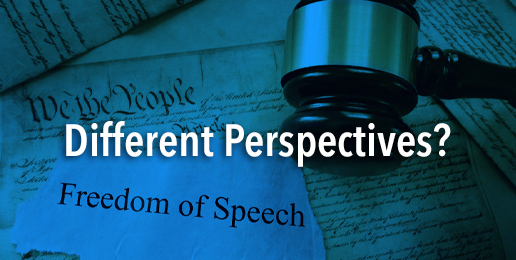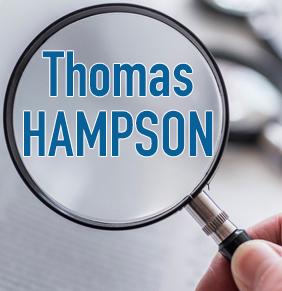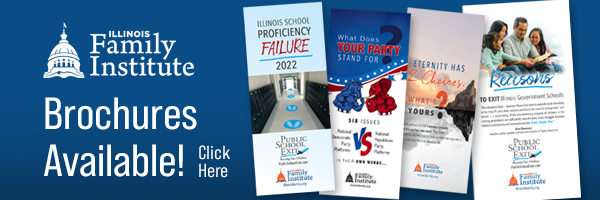
Several essential characteristics separate humans from other mammals.
The most significant among them is our complex reasoning ability.
We can solve problems throughout the full range of our current awareness. We have a powerful capability to observe, collect, and analyze facts. We can formulate theories and design meticulous studies to test them out. And we can debate the meaning of the findings of those studies.
But can we openly challenge those with whom we disagree?
Governor J.B. Pritzker thinks we need the government’s thumb on the scales to ensure an open exchange of views. He recently praised the passage of HB 2789, which he signed into law this past June. He said:
“Illinois became the first state in the nation to ban book bans earlier this year. 2022 had the most attempted book bans on record for the ALA. It was time for us to act.
“Unlike Republicans, I want our children to read as much as they can and to read different perspectives.”
Who is banning books? What books are being banned? How big a problem is this? It all sounds very bad. The Governor went on in a post on X:
“Book bans are about censorship, marginalizing people, marginalizing ideas and facts. Regimes ban books, not democracies.
“Nazi Germany, fascist Italy, the Taliban’s Afghanistan. We refuse to let a vitriolic strain of white nationalism coursing through our country determine whose histories are told. Not in Illinois.”
White nationalism? That’s even worse than just book bans. Republicans are being equated with Nazis, Fascists, and the Taliban.
The problem is that the Governor’s statements completely mischaracterize the truth. As I wrote in my article posted here a couple of weeks ago, the claimed book bans are fictional.
No book bans are being promoted.
There are no Nazis, Fascists, or Taliban in the Republican Party, and it is demagoguery, the opposite of rational argument, for the Governor to make such a claim.
The so-called book ban efforts are, in fact, efforts to restrict access to obscene material and other material available to children that are not age-appropriate. Many of us believe that such restrictions are vital to the health of our society because they protect childhood innocence.
Our Governor does not think so. He believes children should be exposed to “different perspectives.” Books like Gender Queer and All Boys Aren’t Blue, which have explicit descriptions of and encouragement for teens to engage in sexual activities, are among the “different perspectives” the Governor embraces.
Also, books like Crank, which normalizes teen rape, and It’s Perfectly Normal, which promotes all manner of sexual activity, even for children, are considered necessary to achieve balance in their perspectives.
I wonder, did he provide these books to his children?
The children who have access to the books mentioned, and many other such books, cannot rationally weigh the pros and cons of the various perspectives on sexuality. Children have neither the knowledge nor the reasoning capacity to consider these issues since the reasoning center in the human brain does not fully develop until age 25.
That means that children need increasing reasoning challenges as they age. They are not equipped to address adult topics still under fierce debate by knowledgeable, highly intelligent experts in the field. And some who are not so intelligent.
Children need the building blocks to fully use their growing capacity to reason. They need the basics—English, math, science, history, biology. They need to be taught to love our country, our founding fathers, our founding principles despite the flaws.
They don’t need to be confused with high-level controversies in any of these subjects.
They certainly do not need to be sexualized.
I wonder, does Governor Pritzker really want to allow children to be exposed to different perspectives, or does he want them to be exposed only to his perspectives? Are the American Library Association (ALA)-affiliated libraries right there with the governor? For sure, the ALA does not want any restriction on any material for any child. But if my experience at the St. Charles Public Library, a government agency, is any example, libraries don’t want parents exposed to different perspectives.
Jack Rigert of John Paul II Renewal Center and I spoke at that library a few weeks ago to a standing-room-only audience about protecting childhood innocence. We had scheduled three other future presentations, “Stolen Innocence,” at the same location. Jack posted an article on his website— “The St. Charles Library Won’t Ban Porn; They Banned Us Instead!”—about our experience.
Briefly, according to the Director of the library, Kate Buckson, several people complained about our talk, claiming that our comments were offensive.
We are pretty sure we know who the people were who complained. There were four of them sitting together in the same row. Their attitude and demeanor were hostile throughout. They didn’t say anything, but their facial expressions and gestures indicated displeasure with what we were saying.
They did not interrupt our presentation, nor did they ask any questions or debate any of our statements afterward. At the end of the presentation, at the start of the question-and-answer session, they got up and left. Actually, one of them got up and stomped out 15 minutes into the presentation. Were they there to learn, to consider a differing view, or just to gather information to sabotage our future scheduled events?
Immediately upon leaving, they reportedly filed their complaints.
Without questioning us or any other person of the 120 people who attended, the next day the library Director notified us that we could no longer use the library for our presentations.
Our remaining scheduled talks were canceled.
I called the Director to ask about the reason we had been banned. She explained that we had made comments that were offensive to people who belonged to a protected class, namely people who identify as LGBT.
However, she could not give me a single example of anything offensive we said.
Nevertheless, she said it was her opinion that we violated the first paragraph of the library’s meeting room policy, which says in part:
The Library will not discriminate in making its premises available for use based on viewpoints expressed by applicants or the race, national origin, religion, sex, gender, sexual orientation, political affiliations or physical limitations of its applicants. Thus, the Contracting Party’s event will not promote, or have the effect of promoting, discrimination, contempt or hatred for any group or person based on race, national origin, religion, sex, gender identity, sexual orientation, political affiliations or any other similar factor.
The library, she said, does not allow any group to promote any ideas that could result in conflict. (Couldn’t any differing viewpoint result in conflict? Jeez, brawls have been triggered by differing viewpoints about the Bears and the Packers.)
I explained to Director Buckson that we did not say anything that promoted discrimination, contempt, or hatred for any group or person for any reason. (We did target child sexual predators for contempt, I said, but they are not listed as a protected class – at least not yet, so that did not enter into her decision.)
When I pointed out that during my portion of the talk, I had explained transgenderism, gender dysphoria, is still listed in the Diagnostic and Statistical Manual (DSM-5) as a mental disorder, she said:
“Well, that would be offensive to many people. Many don’t agree that it should be listed.”
That statement, alone, she said, disqualifies us from using the library’s meeting rooms, even without any other violation.
Case closed.
Does that sound like an openness to different perspectives? The St. Charles Public Library doesn’t even allow highlighting an entry in the DSM-5, a book in the library’s collection—to an audience of adults. By the way, the full title is Diagnostic and Statistical Manual of Mental Disorders: DSM-5.
Based on the standard, as Director Buckson explained it, if we had simply stood up in front of the crowd and read the Bible, we still would have been banned.
Do you suppose the Governor would defend Jack’s and my different perspective?
Or would he back the action of the St. Charles Public Library?
Where is the law that protects our perspective?
Isn’t that supposed to be the 1st Amendment? Isn’t it the role of government to defend our rights?
I guess such protection does not apply to conservative Christian views.





















